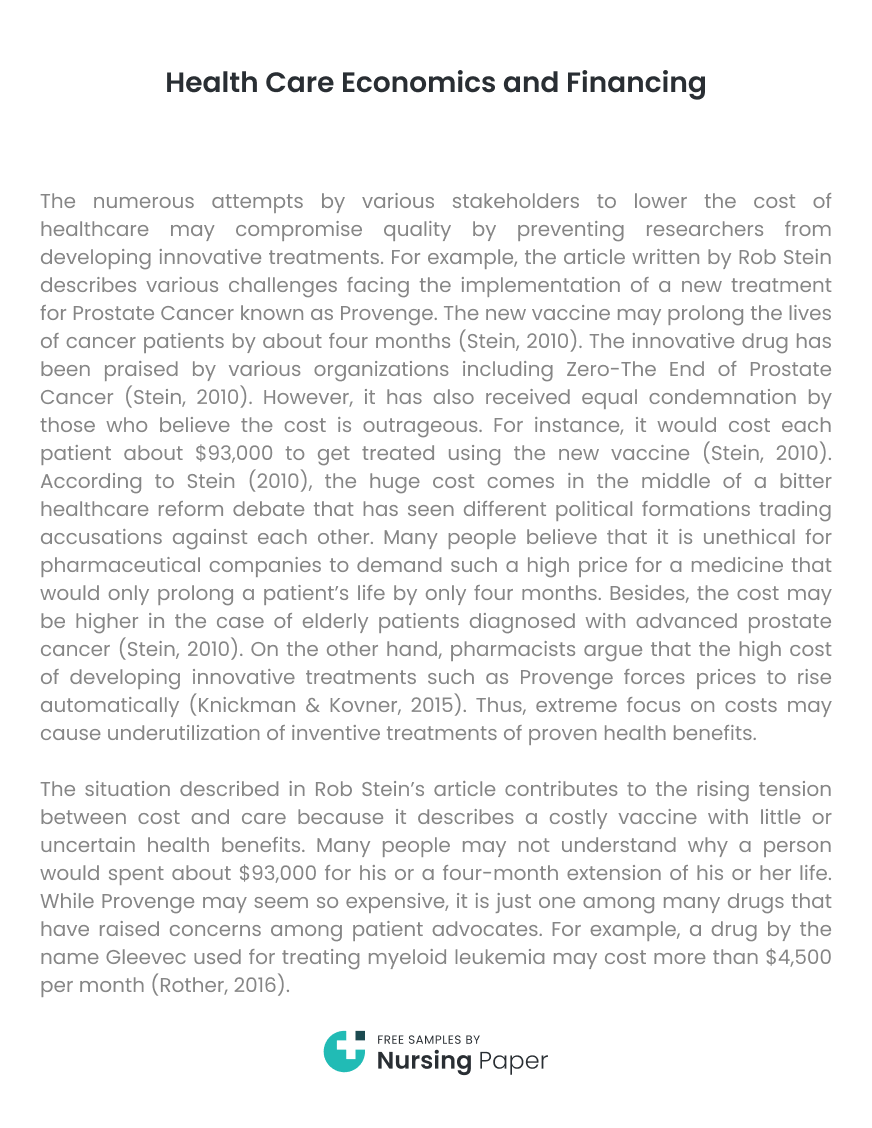
Health Care Economics and Financing
Introduction
The numerous attempts by various stakeholders to lower the cost of healthcare may compromise quality by preventing researchers from developing innovative treatments. For example, the article written by Rob Stein describes various challenges facing the implementation of a new treatment for Prostate Cancer known as Provenge. The new vaccine may prolong the lives of cancer patients by about four months (Stein, 2010). The innovative drug has been praised by various organizations including Zero-The End of Prostate Cancer (Stein, 2010). However, it has also received equal condemnation by those who believe the cost is outrageous. For instance, it would cost each patient about $93,000 to get treated using the new vaccine (Stein, 2010). According to Stein (2010), the huge cost comes in the middle of a bitter healthcare reform debate that has seen different political formations trading accusations against each other. Many people believe that it is unethical for pharmaceutical companies to demand such a high price for a medicine that would only prolong a patient’s life by only four months. Besides, the cost may be higher in the case of elderly patients diagnosed with advanced prostate cancer (Stein, 2010). On the other hand, pharmacists argue that the high cost of developing innovative treatments such as Provenge forces prices to rise automatically (Knickman & Kovner, 2015). Thus, extreme focus on costs may cause underutilization of inventive treatments of proven health benefits.
The situation described in Rob Stein’s article contributes to the rising tension between cost and care because it describes a costly vaccine with little or uncertain health benefits. Many people may not understand why a person would spent about $93,000 for his or a four-month extension of his or her life. While Provenge may seem so expensive, it is just one among many drugs that have raised concerns among patient advocates. For example, a drug by the name Gleevec used for treating myeloid leukemia may cost more than $4,500 per month (Rother, 2016). Another drug by the name Avastin used for treating colon cancer may cost as much as $99,000 per year (Rother, 2016). Before the federal review of Provenge, Medicare was not willing to cover elderly patients using the drug (Stein, 2010). In other words, elderly patients from low-income families may have lost their lives because the cost is too high. Many patient advocates believe that they have a right to protest against the high cost of medication because it denies patients quality care. Even if the federal government agrees to cover the cost using Medicare, Americans may still bear the burden through heavy taxation (Milstead, 2019). Thus, the high cost of medication is bound to have either direct or indirect impacts on people’s expenditures.


The article indicates that Americans want healthcare costs to decrease as much as they want innovative treatments to improve the quality of care. However, high quality care and minimal costs are drifting apart due to high costs of research and development. If the federal government wants to reduce the cost of healthcare, it should provide funds needed by researchers to develop innovative drugs. The financial support would assist pharmacists and other healthcare institutions to provide high quality care at affordable rates. Moreover, the federal government has various research facilities that can be used by pharmacists at minimal expenses. In comparison, the government is likely to spend more in purchasing already developed drugs than supporting the research processes.
1. Rother, J. (2016). Top of the Administration’s Agenda: Stem the Rising Cost of Healthcare. Generations, 40(4), 30-37.
2. Knickman, J. R., & Kovner, A. R. (Eds.). (2015). Health care delivery in the united states (11th ed.). New York, NY: Springer Publishing.
3. Milstead, J. A. (2019). Health policy and politics: A nurse’s guide (6th ed.). Burlington, MA: Jones and Bartlett Publishers.
4. Stein, R. (2010, November 8). review of prostate cancer drugs provenge renews medical cost-benefit debate. The Washington Post. Retrieved from http://www.washingtonpost.com/wp-dyn/content/article/2010/11/07/AR2010110705205.html



The download will start shortly.

The download will start shortly.
 Subject:
Medicine
Subject:
Medicine  Number of pages: 9
Number of pages: 9  Subject:
Health and Social Care
Subject:
Health and Social Care  Number of pages: 4
Number of pages: 4  Subject:
Health and Social Care
Subject:
Health and Social Care  Number of pages: 3
Number of pages: 3  Subject:
Health and Social Care
Subject:
Health and Social Care  Number of pages: 2
Number of pages: 2  Subject:
Medicine
Subject:
Medicine  Number of pages: 2
Number of pages: 2  Subject:
Nursing
Subject:
Nursing  Number of pages: 5
Number of pages: 5  Subject:
Health and Social Care
Subject:
Health and Social Care  Number of pages: 2
Number of pages: 2  Subject:
Health and Social Care
Subject:
Health and Social Care  Number of pages: 3
Number of pages: 3  Subject:
Health and Social Care
Subject:
Health and Social Care  Number of pages: 3
Number of pages: 3  Subject:
Health and Social Care
Subject:
Health and Social Care  Number of pages: 2
Number of pages: 2  Subject:
Health and Social Care
Subject:
Health and Social Care  Number of pages: 7
Number of pages: 7  Subject:
Medicine
Subject:
Medicine  Number of pages: 7
Number of pages: 7  Subject:
Medicine
Subject:
Medicine  Number of pages: 4
Number of pages: 4  Subject:
Nursing
Subject:
Nursing  Number of pages: 1
Number of pages: 1  Subject:
Medicine
Subject:
Medicine  Number of pages: 2
Number of pages: 2 
